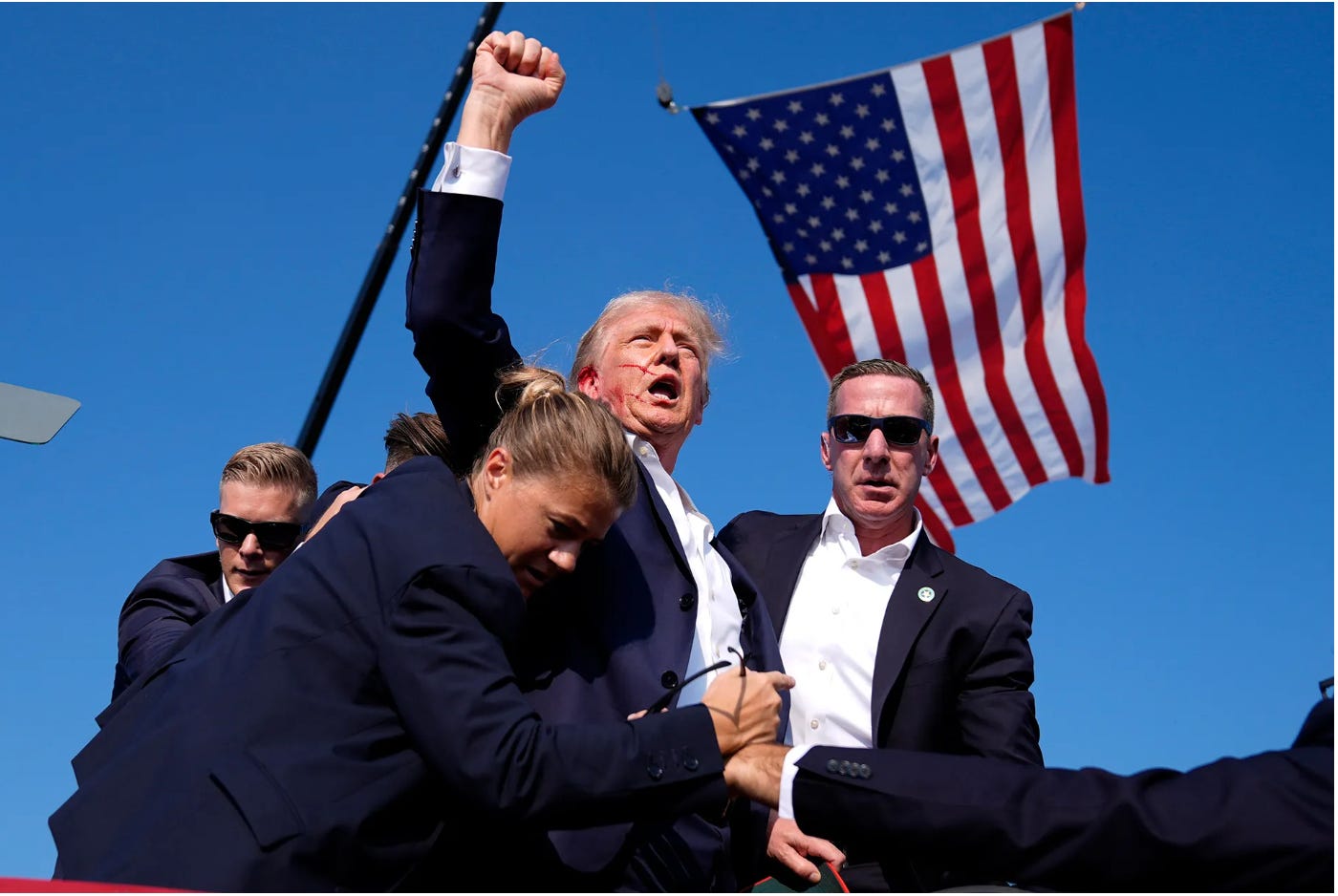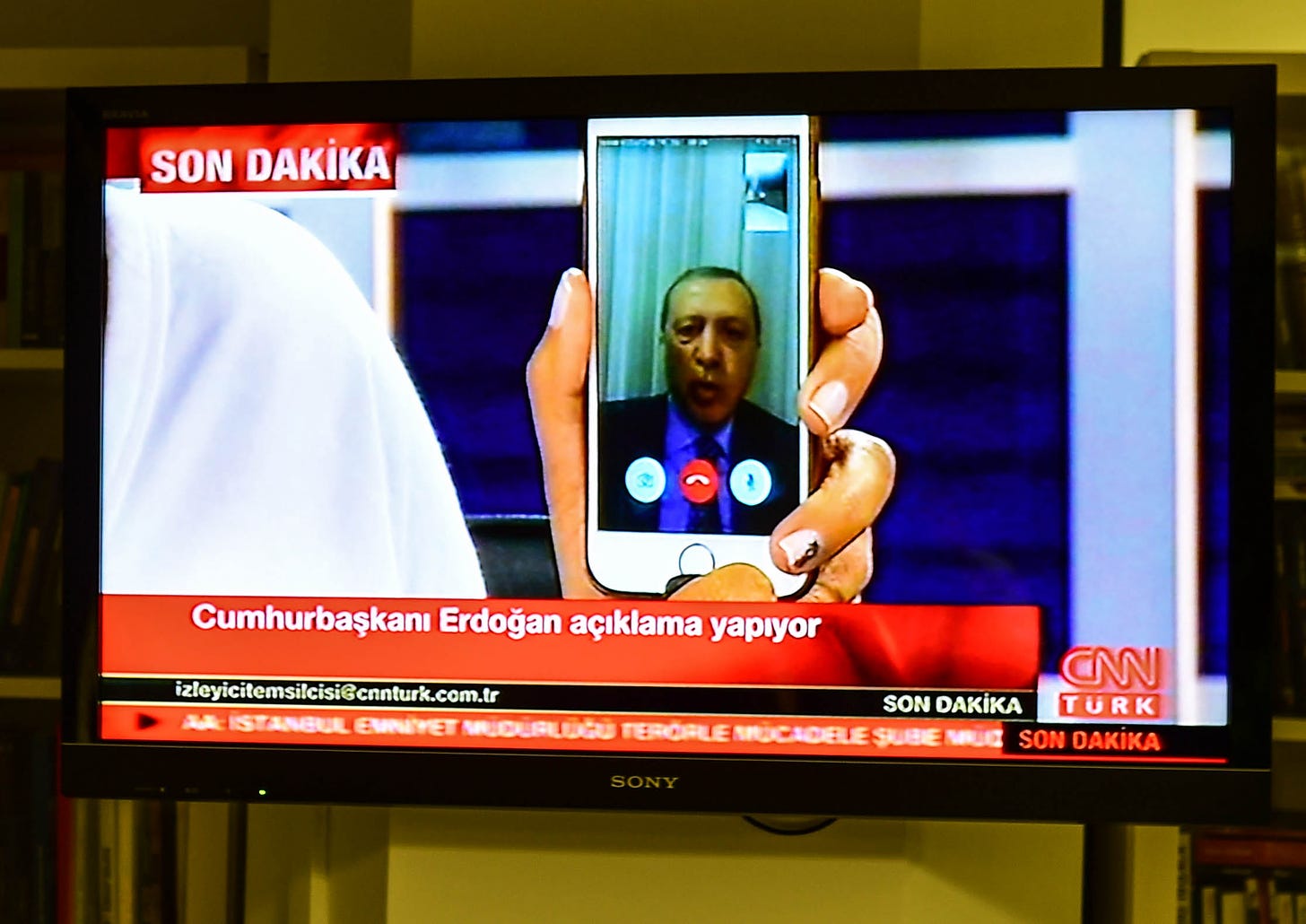The Trump Attack and Authoritarian History
Strongmen have distinctive reactions to "shock events"
Welcome back to Lucid, and a big hello to all new subscribers. I am traveling back from Italy on Friday so we won’t gather for our regular Q&A that day. Instead, the Q&A will be held on Sunday, July 21, 8-9pmET. Paying subscribers will receive a link to register for the Zoom gathering at 5pmET that day. I’m looking forward to seeing everyone and being together at this fateful time.
If you’d like to join the supportive community that has formed around these weekly conversations, you can upgrade to paying or sign up as a paid subscriber here:
________
There has been much media interest in the ways that assassination attempts can affect an autocrat’s political trajectory, so I am writing several related pieces on the subject. This essay sees assassination attempts as part of a more general category of “shock events” that can impact the trajectory of autocrats.
For Politico Magazine, I will be writing about Benito Mussolini (I will post the link to that essay when I appears). The four assassination attempts that followed Il Duce’s 1925 declaration that Italy would become a dictatorship led him to introduce “Laws for the Defense of the State” (1925-1926) that created the regime’s repressive infrastructure.
Although Trump is not a sitting leader, there are lessons for America in this and other case studies of how strongmen handle crises.
______________
Assassination is an occupational hazard for all political leaders, but the strongman’s organization of state power around his person makes him a particular target for his adversaries. Over a century, would-be assassins have targeted leaders at public appearances (Il Duce, Leonid Brezhnev in 1989, while traveling in a motorcade, Trump at a rally in 2024) or have rented hotel rooms and apartments for hits. That has meant a rifle pointed at Mussolini in 1925, a bazooka directed at Pinochet in 1985, and a sniper rifle and Kalashnikov aimed at Putin in 2008.
Assassination attempts are not just psychologically traumatizing for leaders; they often cause lasting health effects. They also accentuate instincts of self-preservation in individuals who are by nature highly suspicious of others and fearful of being betrayed (thus the elevation of loyalty into a governing principle).
Such awful experiences can, paradoxically, also strengthen their political power by boosting their personality cults. Surviving an attack can seem to testify to their omnipotence and also lends credibility to the victimhood personas that many strongmen cultivate.
As for their political effects, assassination attempts are a type of “shock event.” These are grave incidents that often prompt crackdowns or declarations of states of emergency. As with the 1933 Reichstag fire, which birthed the Enabling Act (otherwise known as “The Law to Remedy the Distress of People and the Reich”), shock events can give sitting authoritarian leaders the excuse to do things they’ve wanted to do anyway, like securing their hold on government and silencing the opposition.
In such situations, the temporary state of emergency imposed after a shock event, including a threat on the leader’s life, may become normalized, “no longer the exception but the rule,” as the anti-Nazi philosopher Walter Benjamin wrote. For a century, knowing how to capitalize on calamity, even in the face of an attempt at physical harm or removal from power, has been an essential strongman skill.
The Trump Attack
The unfolding of the terrible moments of the attack on Trump reminds us that strongmen leaders are built differently than other people. They think ahead and they are able to remain in control of the situation, including at the most dramatic moments. They are acutely conscious of the political and media impact of history-making events, even when they are being personally targeted.
Those unfamiliar with strongmen might have found it strange that Trump’s priorities after being wounded by the shooter were not to flee to safety, but instead to tell the Secret Service agents to “wait, wait” so he could put his shoes on, expose his face, arm, and hand to the cameras and crowd, and deliver the fist pump and “fight, fight, fight” message that created an iconic image. In doing so, he also reassured millions of his devoted followers that he was okay and whatever happened they should carry on the battle.
Why the Secret Service allowed him to do these things, in violation of any conceivable security protocols for such moments, is another story. Yet Trump’s conduct in that moment is not out of keeping with the authoritarian way of handling crises so that the victim-strongman duality is reinforced, along with the rationale for persecuting enemies –in Trump’s case, as soon as he can get back into power.
Turkish leader Recep Tayyip Erdogan’s behavior during the dramatic hours of the failed 2016 military coup against him offers another example. On the night of the coup, as rumors circulated that Erdogan was dead or in exile, the President appeared on CNN Turk. Pursued by the military and not trusting any landline, he used the FaceTime application to call the network, demanding to speak on air.
CNN Turk anchor Hande Firat held her own IPhone and lapel microphone up to the camera. Erdogan’s small image on screen added to the sense of Erdogan’s vulnerability.
Even in those moments of grave danger, Erdogan knew how to seize the moment. “We will overcome this,” he told the nation on CNN Turk. "Go to the streets and give them their answer…There is no power higher than the power of the people.” His FaceTime call drew viewers into an unfolding saga that transcended party politics. A month after the failed coup, his approval ratings had risen from 50% to 70%.
In the meantime, the coup attempt provided an opportunity to declare a state of emergency and consolidate his power. “[T]his uprising is a gift from God to us,” Erdogan declared a few days after that tumultuous night. A sweeping purge started with the Turkish army and continued with the Kurdish opposition, individuals associated with Muslim cleric Fethullah Gülen’s Hizmet movement, and members of the judiciary, the press, and academics.
The coup plotters who survived got life in prison, but by 2019, over 170,000 people who had nothing to do with the coup attempt had been dismissed from state positions. Over 90,000 had been jailed, many on charges of terrorism; 3,000 schools and universities closed; and thousands of Turks, including entrepreneurs and journalists, had gone into exile.
Trump’s call for “unity” following the attack also has a history —unity being understood in the strongman manner as the labeling of any criticism against the leader as dangerous and an incitement to further violence. On the first anniversary of the coup attempt, Erdogan declared a new holiday: the “July 15 National Day of Democracy and Unity.” By the second anniversary, he had been re-elected with expanded powers: since 2018, he has served as both President and Prime Minister.
We can watch carefully the messaging that comes out of the Trump campaign in the next weeks, and realize that, far from becoming more moderate, the strongman always renews his calls for vengeance after threats on his power or his life.






Not sure why his shoes were off but it would be interesting to know why. Was he that scared? He looked like a scared, angry old man. While going out you could see a big bald spot on his head which tells us how carefully they manage him. It must take hours to get his hair and makeup right.
The shooter evidently comes from a right wing family. Neighbors said they've seen trump signs in the yard. I've read reports of over a dozen guns found at the house. All his friends said he's a republican and conservative. I'm not sure we'll ever get to the truth.
Unfortunately, we have already had our “shock moment” or our "Reichstag Fire" more than 20 years ago - 9/11.
What followed was the massive increase in state surveillance, the violation of established norms and international laws (torture, Guantanamo and Abu Ghraib prisons, etc.), and mendacious, unjustified, aggressive wars supported by both parties.
Societies and governance are held together by norms and once these are violated, the cornerstone is removed, and the path to authoritarianism accelerates until the warnings eventually become blinking red lights as we see today.